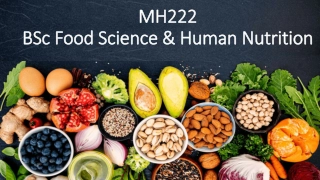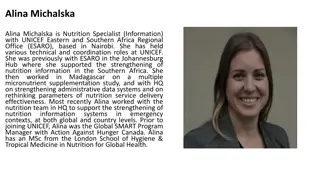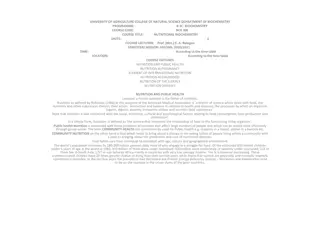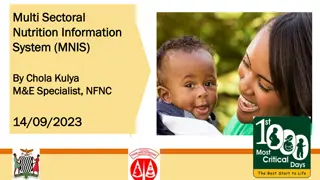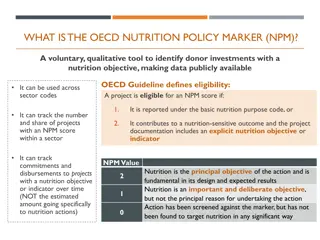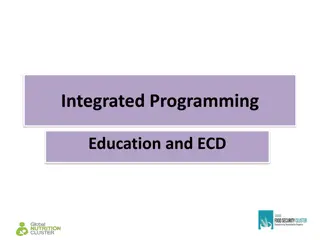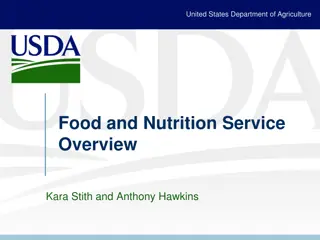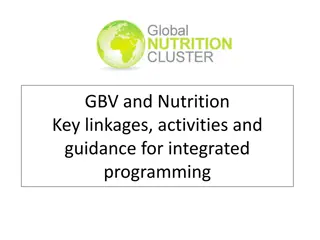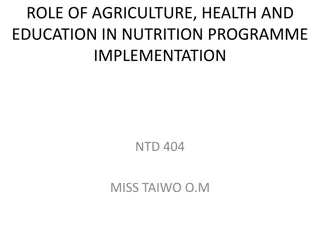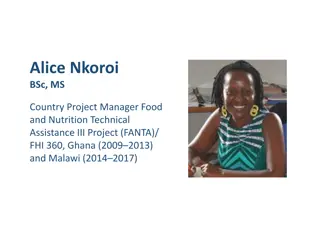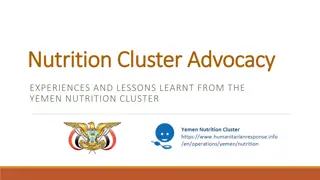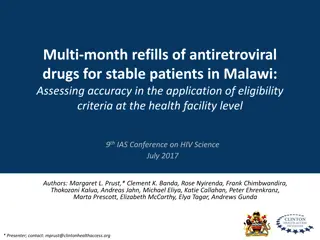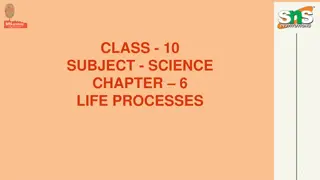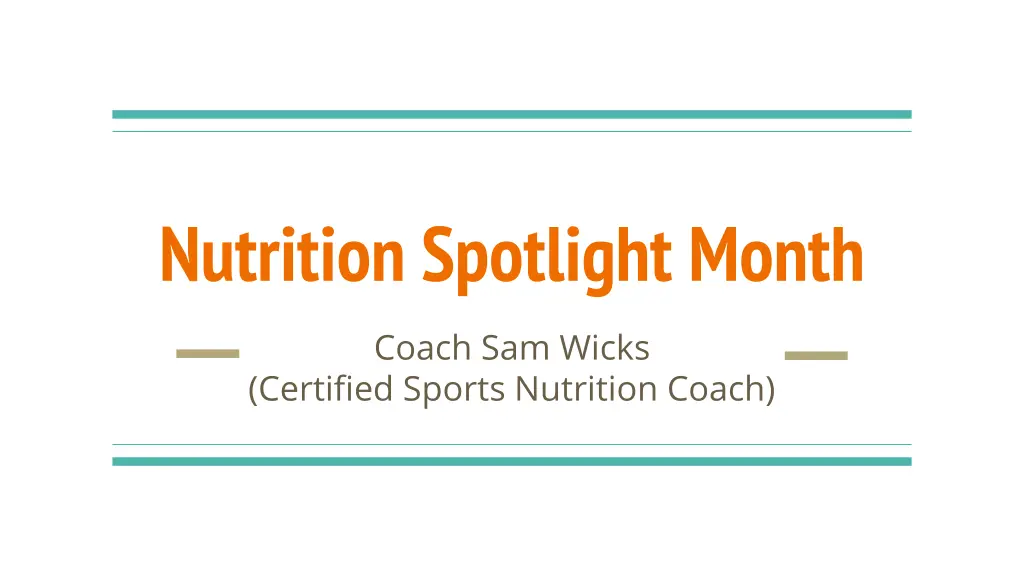
Importance of Nutrition and Fueling for Athletes
Providing the right nutrition and fueling strategies is crucial for athletes to perform at their best. This presentation by Coach Sam Wicks, a Certified Sports Nutrition Coach, covers basic nutrition information, fueling ideas, and the significance of timing meals for optimal performance and recovery. Learn about the importance of carbohydrates and proteins in supporting athletic endeavors.
Download Presentation

Please find below an Image/Link to download the presentation.
The content on the website is provided AS IS for your information and personal use only. It may not be sold, licensed, or shared on other websites without obtaining consent from the author. If you encounter any issues during the download, it is possible that the publisher has removed the file from their server.
You are allowed to download the files provided on this website for personal or commercial use, subject to the condition that they are used lawfully. All files are the property of their respective owners.
The content on the website is provided AS IS for your information and personal use only. It may not be sold, licensed, or shared on other websites without obtaining consent from the author.
E N D
Presentation Transcript
Nutrition Spotlight Month Coach Sam Wicks (Certified Sports Nutrition Coach)
Disclaimer: 1. I am not a nutritionist! a. Certified Sports Nutrition Coach b. Basic knowledge for sports fueling - General Information c. For specific cases, encourage working with nutritionist! 2. There is no product sponsor for this presentation a. If there are pictures or reference to different items, this is only for effect, not for brand preference 3. I don t know everything (and don t pretend that I do) a. But I will work hard to find educated answers for you and your athlete
Plan for Todays Session 1. Review of Basic Nutrition Information a. WHAT to eat b. How to best fuel c. Examples of fueling ideas 2. Touching on WHEN to eat a. This is one of our primary targets of today s session b. Example food tracking sheet to determine best time of day to fuel 3. Follow up for questions a. Question and answer session
PART 1 Nutrition Basics - follow up from last week
Why is your nutrition important? If you aren't providing your body fuel it needs, it can't do its job. Although as athletes, we are thinking about fueling for sport, we also need to provide our bodies enough food to use as energy for basic daily life. Our brain uses glucose, or sugar, to operate, and without it, we notice difficulty concentrating, problem solving, and participating in school and extracurricular activities. Nutrition also is a way to provide the building blocks for our body to regenerate, allowing our cells to repair themselves after a hard practice, improve our fatigue level, and have energy reserves to come back the next afternoon or day to do it all again.
Fueling for Athletes As athletes, our goal is to anticipate our body's energy needs and provide a balanced snack or meal to assist in fuel and recovery. Although we will go into specific amounts in our next section, making sure to include proteins, fruits & veggies, and grains & starchy carbs in each meal will help to achieve this goal. For snacks, we should not just eat carbs or protein by themselves, but put them together for our bodies to absorb and maximize use of all fueling opportunities.
What we should be eating: Carbohydrates - Proteins - These are the main source of energy in the body. These should be included during meals, as well as in snacks eaten before and after practices for maximized fueling. Some examples: Root vegetables, whole grains, oats, beans, pasta, dairy, whole grain cereals, fruits, vegetables This is the main way we repair our muscles following physical activity This also is what controls how full we feel! This doesn t get stored in the body, so we need small amounts frequently throughout the day Some examples: Boneless/skinless and lean meat, fish, tofu, edamame, beans
What we should be eating: Fats - Hydration - Fats are required for our body to function properly, but we need to keep in mind the type of fats we are having. They allow brain function, energy, and fat soluble vitamin absorption Some examples: Olive / canola / fish / avocado oils, egg yolks, nuts, seeds, nut butters (like peanut/almond) Hydration is equally important as the foods you re eating. Water makes up 45-75% of your body, and plays a role in every cell, organ, tissue in the body. Some examples: Water by itself, food with high water content, common sports drink (these should be used in small amounts)
What to eat resources: Visit Team Website Log in to access information (only for our NLSC members!) Click Dryside Tab Scroll down to Week One Resources for more information on all this information Questions before moving on to WHEN to eat?
PART 2 When should you be eating?
When should you be eating? Before you re using your body at a high athletic level After you ve finished working out in order to aid in recovery Throughout your day to keep your body fueled, never getting too nutrient depleted that you have to dig yourself out of a energy hole You should also be eating before a day of competition and throughout each session / day. There will be more specifics on this coming in the next couple of weeks.
We should be eating every 4 hours Why? Our bodies only absorb a certain amount of protein at a time, so we need to fuel it in small amounts frequently We also often burn through the carbs (when broken down becomes glucose) when we are using our brains, muscles, and organs something we do at all hours! Think of what you need to do for school, participating in swimming or dryland training What about all the other activities done during the day?
Before practice Eating something before practice - a mainly carbohydrate based snack to provide quick energy. This should be happening ~30-60 minutes prior to getting into the water. If you have a sensitive stomach eating prior to practice, choose something bland to eat in order to tolerate it better. This may include toast, apple sauce, rice, or bananas (for an example). Make sure to hydrate as well!
After practice To promote the best muscle and energy recovery, you should be eating something within 30 minutes of finishing physical activity. If you have practice and then are going to do dryland, bring a quick snack of carbs + proteins to start muscle recovery and replenish energy stores. If you are finishing practice after normal dinner time (you eat dinner before practice), eat a small snack to promote muscle recovery while sleeping. This doesn t need to be big!
General Nutrition Food Tracking Let s use this as an example: General Nutrition Tracking Sheet This is NOT provided for you to use this as a calorie counter. As someone who is just starting on their nutrition journey, it is almost more important to help create the habit of WHEN you re eating vs what is actually being consumed (or how much). If you have concerns about how much you/your athlete is eating/not eating, please let me know separately from this presentation.
PART 3 Question and Answer Portion

